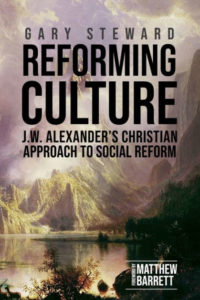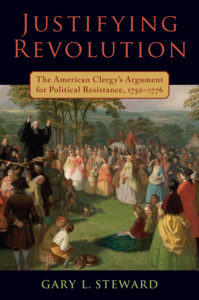
Author’s Corner: Gary Steward
Each week on Credo we welcome you to join us in the Author’s Corner where we will meet a set of authors whose recent books deserve your attention and might even help you grow in your knowledge of theology, history, philosophy, and the scriptures. We hope the Author’s Corner can keep you up-to-date on the most important books published today and where you can find them.
On today’s Author’s Corner, we present you with two works of history and theology that are rich in wisdom for today’s world.
Dr. Gary Steward (B.A., M.Div., Th.M, Ph.D.) is an Assistant Professor of History at Colorado Christian University in Lakewood, Colorado. Prior to this, he served as the pastor of Calvary Baptist Church in St. John’s, Newfoundland. He holds a Ph.D. in Church History and Historical Theology from the Southern Baptist Theological Seminary in Louisville, Kentucky, and currently lives in the Denver area with his wife and three children.
R eforming Culture: J.W. Alexander’s Christian Approach to Social Reform (Joshua Press, 2020)
eforming Culture: J.W. Alexander’s Christian Approach to Social Reform (Joshua Press, 2020)
How should we address the social ills in our culture? How should we respond to the social and economic inequalities around us? James W. Alexander (1804-1859) thought deeply about these problems and wrote extensively about how these issues might be addressed from a Christian perspective. The son of Princeton Seminary’s first faculty member, Alexander rose to prominence in the nineteenth century as a Christian leader in Virginia, New Jersey, and New York City. While he authored numerous books and articles, Alexander’s contribution to evangelical thought has largely been overlooked. Alexander was deeply concerned about the economic, political, and social structures of antebellum American society, and he left behind a great deal of material that addressed these issues. In an age when social reformers traversed America with an abundance of novel ideas and utopian schemes, Alexander believed that the Christian gospel and the influence of Christian truth was the best means approach for bringing about lasting good in the world around us. Alexander’s thoughts on government, economics, education, and race continue to be relevant for our own day. While the complexion of our social ills may have changed, the solution to needs of our culture have largely remained the same.
J ustifying Revolution: The American Clergy’s Argument for Political Resistance, 1750–1776 (OUP, 2021)
ustifying Revolution: The American Clergy’s Argument for Political Resistance, 1750–1776 (OUP, 2021)
Drawing from a wide range of sources, Justifying Revolution: The American Clergy’s Argument for Political Resistance, 1750-1776 answers the question of why so many American clergymen found it morally and ethically right to support resistance to British political authority by exploring the theological background and rich Protestant history available to the American clergy as they considered political resistance and wrestled with the best course of action for them and their congregations. Gary L. Steward argues that, rather than deviating from their inherited modes of thought, the clergy who supported resistance did so in ways that were consistent with their own theological tradition.

